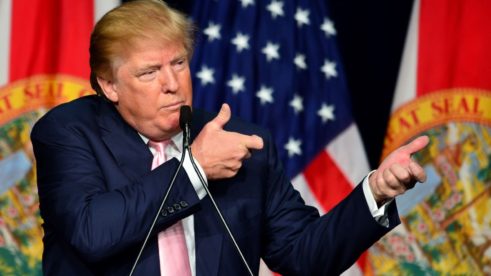Donald Trump’s focus on the automotive industry in Michigan, a critical swing state, is striking a chord with some voters as he campaigns ahead of the upcoming election. Doug, a longtime resident of Warren, Michigan, and a machine repairman at Ford’s electric vehicle division, is one such voter. Although he builds electric vehicles, Doug is skeptical of them and concerned about the future of his job. He has previously voted Democrat, but Trump’s message about potential job losses due to the shift towards electrification is resonating with him and others in the state.
Trump’s narrative paints a grim picture for Michigan’s auto industry workers, claiming that Kamala Harris, the Democratic candidate, plans to phase out gas-powered vehicles entirely. Doug believes this shift is already costing jobs, echoing the concerns Trump has amplified in his speeches. With less than a month to go before election day, Trump has intensified his rhetoric, warning voters that Harris’s policies could threaten their livelihoods.
Harris Responds to Trump’s Claims in Michigan
In contrast, Kamala Harris has worked to counter Trump’s message in her own Michigan campaign stops. At a rally in Flint, Harris rejected Trump’s claim that her administration would ban gas-powered cars, asserting that she would not dictate what kind of cars Americans should drive. She reminded voters of her earlier stance supporting the transition away from petrol-powered cars during her 2019 presidential run but emphasized that she no longer advocates for such a drastic shift.
Harris’s challenge lies in convincing skeptical voters like Doug, who remain fearful about the future of their jobs in the face of electrification. Despite Harris’s assurances, many Michigan voters are still swayed by Trump’s message, which has tapped into broader economic concerns in the state. Experts argue that Trump’s focus on electric vehicles is part of a larger effort to appeal to disillusioned voters in key midwestern swing states.
Union Workers Split Between Candidates
Michigan’s labor unions, a crucial voting bloc in the state, are divided over the electric vehicle debate. The United Auto Workers (UAW) union has expressed concerns about job losses linked to the push towards electric vehicles. Trump has seized on these fears, arguing that UAW’s leadership is pushing for a full transition to electric cars, a move he claims could destroy the industry. This message has found fertile ground among some rank-and-file members, many of whom have drifted away from the Democratic Party in recent years.
Harris, on the other hand, has secured key endorsements from labor unions, including the Teamsters. However, she faces an uphill battle in winning the hearts of union members who remain skeptical of the Democratic Party’s stance on electric vehicles. Michigan’s Teamsters President Kevin Moore called Trump’s claims a “bold-faced lie,” emphasizing that gas-powered and electric vehicles could coexist. Nonetheless, Harris’s campaign must navigate the complex dynamics of a labor force that feels increasingly uncertain about its future.
Impact of Electric Vehicle Investments in Michigan
The Biden-Harris administration’s $1.7 billion investment in Michigan to convert auto plants for electric vehicle production is a central piece of their economic strategy for the state. However, this massive investment has not translated into the political gains the Democrats were hoping for. Many workers in the auto industry remain unconvinced that the shift to electric vehicles will benefit Michigan’s economy in the long run. Some, like Trump’s running mate JD Vance, have dismissed these investments as “table scraps” compared to the anticipated job losses.
The reality of the situation is more complex. Automakers such as General Motors have embraced the electric vehicle transition, and factories are being retrofitted to support the new technology. However, the cost of transitioning remains high, and the long-term benefits to Michigan’s economy are uncertain. The challenge for Harris and her running mate, Minnesota Governor Tim Walz, is to convince voters that these investments will not only preserve jobs but create new opportunities in the state’s evolving auto industry. For now, Trump’s warnings of job losses continue to hold sway over many Michigan voters, leaving the race in the state increasingly competitive.














